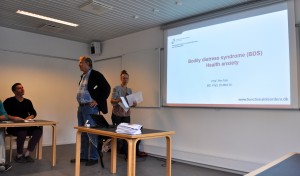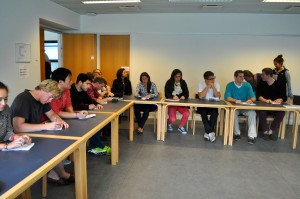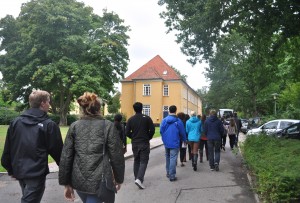First off, I think a brief introduction is in order to give my posts some context. So my name is Liz Berg and I’m a junior majoring in Biology and Psychology with an emphasis in Neuro. I’m currently living with a host family in Espergærde, Denmark and attending class at the Danish Institute for Study Abroad (DIS) in Copenhagen (I’ve been here for a little over 6 weeks). Unlike a typical Danish university, DIS is designed for students who are studying abroad, which means that I go to class (taught by Danish professionals) with American students from all across the U.S. and the program provides several breaks for class trips as well as independent travel. Each “normal” 3-credit class meets for 80 minutes twice a week but I’m also in a 1-credit class that only meets once a week. There were so many awesome neuroscience classes to choose from but my courses are as follows:
- Psychopharmacology: Substances and the Brain (core course)
- Immunology
- Neuroplasticity: From Neurons to Behavior
- Neuroscience of Human Consciousness: The Feeling of Being
- Psychology and Criminal Behavior
- Auschwitz: from Genocide to Memorial (1 credit)
Each student has a “core course” with which you take 2 trips. I went with mine to Western Denmark for 3 days and will also go to Basel, Switzerland and Munich, Germany for 6 days (the trips are a combination of academic and cultural visits/activities). The class about Auschwitz is a less demanding class as it is aimed at preparing us for a trip to Krakow, Poland and a visit to Auschwitz.
I suppose that’s enough info to set the scene so I can delve a little deeper into my neuro courses. First of all, Psychopharm is all about substances (neurotransmitters, drugs) and the brain especially in relation to disorders like schizophrenia and depression. We’ve recently finished our discussion regarding schizophrenia in which we learned about symptoms, the major neurotransmitter pathways involved, and the pros/cons of the various medications available. Our homework assignments are all readings from a textbook and class consists of our professor, Jesper, presenting slides but since he both poses his own questions to the class and the class asks a lot of their own, there’s a good amount of back and forth discussion (did I mention that in Psychopharm, Neuroplasticity, and Consciousness we sit in an oblong semicircle around the outside of the classroom rather than in rows?).
Neuroplasticity is centered around how our brains change as a result of developmental and environmental influences. Topics have included synaptic pruning, critical periods, and language acquisition. So far, the discussions have been rather big-picture and we have yet to discuss neuroplasticity on a neuronal or molecular level. Our assignments are generally either two book chapters or articles and we recently completed group presentations on topics of our choosing. This class is very much like Psychopharm in that our professor, Claudia, presents slides on the topic but there’s a lot of discussion among students and between the students and professor.
Consciousness is a very unique and somewhat abstract concept, which makes studying it quite difficult so there’s limited knowledge regarding its neurological basis. For each class we read two articles, most of which are philosophers arguing for their theory of consciousness and others are attempts at studying or pinpointing consciousness’ neurological correlate(s). A central debate revolves around the issue of types of consciousness: Ned Block proposes 4 types (access, phenomenological, monitoring, and self) while Sid Kouider argues that such a distinction is unnecessary and consciousness should be regarded as a single entity. One’s stance on this issue is important for studying consciousness because it will influence the way in which a study is conducted and how the results are interpreted. This class is also taught by Claudia so it’s structured similarly (we just did group presentations on a topic of our choosing) but there’s quite a lot more abstract thinking and discussion due to the nature of the topic.
That’s pretty much the low-down on my neuro classes, at least so far, but there’s another important aspect of my DIS education that I want to highlight. No classes are scheduled on Wednesdays so all students are free to go on field trips! Each class has two scheduled field studies for the semester when we get to do an activity, visit a relevant institution, and/or hear from professionals in our fields of interest. Thus far, I have been on 3 (one for Psych of Criminal Behavior, one for Neuroplasticity, and one for Consciousness) and have thoroughly enjoyed each.
For Neuroplasticity we visited Lion’s Kollegiet, a housing/rehabilitation center for people with brain damage (mainly acquired), and for Consciousness we went to the Center for Subjectivity Research at the University of Copenhagen where we heard from three Ph.D. students about their projects: one focusing on bodily agency of cerebral palsy patients (and the therapeutic potential for exercises using an X-Box Kinect-type device), one regarding shame, and one about the phenomenology of playing music.
I have recorded both of these visits and will work on making them available. I have also recorded much of my core course’s trip to Western Denmark, where we visited the Nykøbing Sj. Psykiatriske Museum, the Research Clinic for Functional Disorders and Psychosomatics at the Aarhus University Hospital, the Department of Clinical Medicine’s Translational Neuropsychiatry Unit at Aarhus University, the Neurobiology Department at the University of Southern Denmark, and Lundbeck so I hope to share those as well.
I’m more than happy to answer any questions and/or address requests for more information (whether related to neuro or not)! Otherwise, stay tuned for more updates on all things neuro at DIS!

Presentation by Per Fink, Ph.D., Dr.Med.Sc. at The Research Clinic for Functional Disorders and Psychosomatics in Aarhus, Denmark.

Many of our academic visits involved listening to speakers talk about their research and subsequently engaging in discussions.

